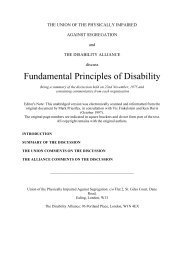Global-Report-Living-Colour-dr2-2
Global-Report-Living-Colour-dr2-2
Global-Report-Living-Colour-dr2-2
Create successful ePaper yourself
Turn your PDF publications into a flip-book with our unique Google optimized e-Paper software.
70<br />
Inclusive Communities = Stronger Communities<br />
GLOBAL REPORT ON ARTICLE 19: THE RIGHT TO LIVE AND BE INCLUDED IN THE COMMUNITY<br />
incomes with regard to the availability and the type of<br />
information about national services and resources.<br />
Considerable information exists for some high-income<br />
countries; detailed reports have been published, based on<br />
extensive information systems. By contrast,<br />
documentation is much more scarce and inaccurate in<br />
countries of low or middle income. Most of the time, such<br />
documentation is based on specific experiences of a given<br />
group of individuals, a type of diagnosis, or a territory.<br />
However, at all income levels, to find an overall figure that<br />
will describe the situation at the national level is difficult.” 2<br />
The World <strong>Report</strong> on Disability published in 2011 by the<br />
World Health Organization and the World Bank describes<br />
barriers to assistance and support for the population of<br />
people with disabilities and highlights some particular<br />
issues for people with intellectual disabilities.<br />
“Most assistance and support comes from family members<br />
or social networks. State supply of formal services is<br />
generally underdeveloped, not-for-profit organizations<br />
have limited coverage, and private markets rarely offer<br />
enough affordable support to meet the needs of people<br />
with disabilities.” 3<br />
While these resources present policy and legislative level<br />
information, there is little information about services and<br />
supports for people with intellectual disabilities and<br />
families. The information that is available speaks to what is<br />
“on the books”, not the availability, quality or<br />
appropriateness of services and supports. The stories and<br />
experience of parents and people with intellectual<br />
disabilities which are presented here are an important and<br />
powerful source of knowledge and so crucial to improving<br />
their lives in the years to come.<br />
Our survey respondents were clear that the services and<br />
supports that are available are segregated and institutional<br />
in nature:



